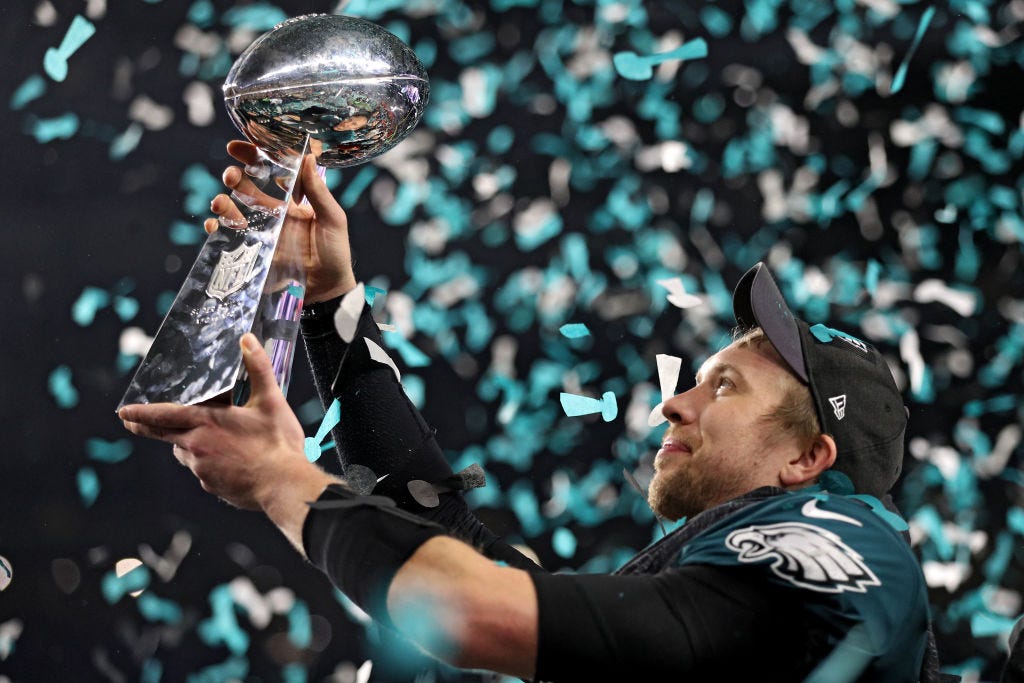The 2018 Super Bowl and the Meaning of Sukkot
How repeated failures and setbacks paved the way for NFL quarterback Nick Foles’ greatest victory

We live in an age of ageless Toms. While one is headlining high-flying sequels, another is letting fly with touchdown passes yet again. With the football season ramping up, and Tom Brady doing his wrinkle-free thing, let’s take this Sukkot as an opportunity to remember that in 2018 he was bested by someone who was better than him at one of the holiday’s major themes: quitting.
In a result that to this day remains a head-scratcher to millions, Philadelphia Eagles quarterback Nick Foles led his team to a stunning victory over the heavily favored Patriots, led by Brady. Brady, of course, would go on to win two out of the next three championships, adding to his record-setting total of seven victories in the sport’s biggest night. But that February evening in 2018, Foles—a second-string quarterback who only got the ball because his team’s first choice, Carson Wentz, was injured—defeated him. Why?
The answer, pored over by sports psychologists and scholars, is surprising. It turns out that Foles had tried his hand at baseball earlier in life. And he decided he wasn’t good enough. As a teen, he dabbled in karate but came to the realization that he wasn’t exactly headed for the Olympics. He had a deep passion for basketball. He even made his high school’s varsity team as a freshman. But he realized he just wasn’t improving enough to make it to the pros. Others would’ve been dissuaded by so many failures; Foles turned them into an engine.
As journalist David Epstein notes in Range: Why Generalists Triumph in a Specialized World, some of the most successful athletes, like Foles, are ones who have tried, and realized when to move on from, other sports. Tom Brady himself was drafted into professional baseball before football. Investing so deeply in something that doesn’t last—spending physical and emotional energy to build something up only to tear it down, making something beautiful and meaningful only to pack it away in the garage, literal or metaphorical—would be inconceivable to many people. But not to some of our greatest champions, and not to anyone who internalizes the meaning of Sukkot.
You see, for eight days, you eat and sleep in a sukkah, or hut, a rickety structure, traditionally made of small metal pipes, canvass walls, and bamboo roofing. You’ve likely asked your oldest teenager or a friend down the block to help you build it, and it’s asymmetrical, has no floor other than the grass in your yard, and is decorated by your preschooler’s school-made paper decorations (which, by the way, Jewish law says you can’t repair if they break over the holiday). It’s no one’s idea of a stable, pristine home, and that’s exactly the point. Sukkot reminds us that insecurity is constant, perfection is unattainable, and knowing when and how to move on despite all this is essential for holding on to faith.
Rabbi Eliyahu Kitov understood Sukkot well. Born in 1912 in eastern Poland, the author of a book on Judaism’s traditions still learned by countless Jews worldwide knew the pain of failure. During his youth, he was a volunteer tutor for abandoned children in his home country. After emigrating to Israel in 1936, he worked in construction, started a school, and edited a newspaper. Shortly after the birth of the modern State of Israel, he ran atop the candidate list of a political party for a seat in Israel’s parliament. He lost. Two years later, this time in the top spot of a different party’s slate, he ran again. And he lost again.
Establishing a small publishing house, and gathering what he could from private fundraising, he turned to writing full-time. He penned articles and books on Jewish history, belief, and the Bible.
For Kitov, Sukkot undoubtedly resonated. After all, it is premised upon the commandment to build a house that freely acknowledges it cannot possibly be the basis of our security. We construct the sukkah, decorate it, celebrate in it, then take it apart and tuck it away in the attic for another year. Building and having to break, building again and being broken again, knowing that elections will be lost, jobs will disappear, and failures will be suffered, and being wiser and even more faithful because of this, is what the holiday’s purposeful instability strives to teach.
As Kitov writes:
It is the usual way of human beings to feel secure and unafraid while under the shelter of their own roofs. On emerging from their homes, their sense of security is diminished and they begin to feel fear. The Jewish People, however, is different. While in their homes the whole year, they are apprehensive. But when Sukkot comes and they leave their homes and come under the shadow of the sukkah, their hearts are full of trust, faith and joy, for now they are protected, not by the protection of their roofs, but by the shadow of their faith and trust in God.
Nick Foles put it just the same way. After his stunning upset victory, he told reporters about how, ravaged by injuries, he thought about calling it quits:
I wanted to retire from the NFL, and I really struggled. I couldn’t pick up a football for about eight months. I had no love for the game, and it was tough. I talked a lot to my wife, and I remember just saying a prayer. It wasn’t an easy decision. It’s not like it was 100 percent, but my faith and my guidance and the way I felt like going into that experience allowed me to grow to make me a better player now, because you experience those emotions, you go through that. It’s an emotional thing, it’s something I’ve done my entire life. And to go through that and make that decision, it wasn’t easy.
So whether or not Brady will once again beat your team this season (is there any chance he won’t?), let’s take comfort in the discomfort of Sukkot while we raise a glass to Nick Foles. After all, he and the holiday remind us that though we be among the unfortunate who age, mess up, quit, and move on, we can sit, ever still, underneath the shadow of faith.



